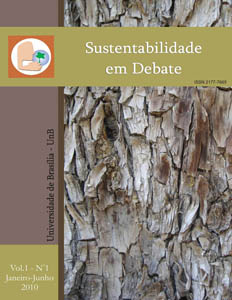Fatores Político-Econômicos do Desmatamento na Amazônia Oriental
DOI:
https://doi.org/10.18472/SustDeb.v1n1.2010.728Keywords:
Sustainable development, Environmental policy, AgribusinessmAbstract
This paper studies the relationships between political and productive
activities and the deforestation in Eastern Amazon biome with the purpose
of evaluating the main factors of the latest regional forest’s deforestation.
Methodologically, it used a multiple regression of the districts in Eastern
Amazon from 2007 to 2008. The results evidenced that the primary driving
forces of the recent deforestation in region are the bovine cattle breeding
and agriculture, the wooden and charcoal production, the extraction of
non timber forest products, the distance for National Environmental Offices
in region, the protected areas and the forest stock. In this context, the
researches on deforestation have to focuses on the economic activities
that can protect de forest against deforestation.
Downloads
References
ALVES, D. S. O processo de desmatamento na Amazônia”. Parcerias Estratégicas, v. 12, 2001, p. 259-275.
ANGELSEN, A.; KAIMOWITZ, D. Rethinking the causes of deforestation: lessons from economic
models. The W orld Bank Research Observer, v. 14, n. 1, 1999, p. 73-98.
ARIMA, E. Y.; WALKER, R. T.; PERZ, S. G.; CALDAS, M. Loggers and Forest Fragmentation: Behavioral Models of Road Building in the Amazon Basin. Annals of the Association of American Geographers, v. 95, n. 3, 2005, p. 525”“541.
BARBIER, E. B. The economics of tropical deforestation and land use: an introduction to the
special issue”. Land Economics, v. 77, n. 2, 2005, p. 155-171.
BARRETO, P. et al. Pressão humana na floresta amazônica brasileira. Belém: World Resource Institute.
BECKER, B. K. Amazônia: geopolítica na virada do III milênio. Rio de Janeiro: Garamond, 2004.
BECKER, B. K. Geopolítica da Amazônia”. Estudos Avançados, v. 19, n. 53, 2005, p. 71-86.
BÖRNER, J.; Mendoza, A.; Vosti, S. A. Ecosystem services, agriculture, and rural poverty
in the Eastern Brazilian Amazon: interrelationships and policy prescriptions”. Ecological Economics, v. 64, 2007, p. 356-373.
BRASIL. Plano Amazônia Sustentável: diretrizes para o desenvolvimento sustentável da Amazônia Brasileira”. Brasília: Ministério do Meio Ambiente, 2007.
BÜRGI, M.; Hersperger, A. M.; Schneeberger, N. Driving forces of landscape change ”“ current
and new directions. Landscape Ecology, v. 19, 2004, p. 857-868.
CATTANEO, A. Inter-regional innovation in Brazilian agriculture and deforestation in the Amazon: income and environment in the balance. Environment and Development Economics, v. 10, 2001, p. 485”“511.
CLARK, S., Bolt, K., Campbell, A. Protected areas: an effective tool to reduce emissions from deforestation and forest degradation in developing countries? Cambridge, U.K, 2008. Working Paper, UNEP. World Conservation Monitoring Centre.
Downloads
Published
How to Cite
Issue
Section
License
Copyright (c) 2010 Sustentabilidade em Debate

This work is licensed under a Creative Commons Attribution-NonCommercial-NoDerivatives 4.0 International License.
SUSTAINABILITY IN DEBATE – Copyright Statement
The submission of original scientific work(s) by the authors, as the copyright holders of the text(s) sent to the journal, under the terms of Law 9.610/98, implies in the concession of copyrights of printed and/or digital publication to the Sustainability in Debate Journal of the article(s) approved for publication purposes, in a single issue of the journal. Furthermore, approved scientific work(s) will be released without any charge, or any kind of copyright reimbursement, through the journal’s website, for reading, printing and/or downloading of the text file, from the date of acceptance for publication purposes. Therefore, the authors, when submitting the article (s) to the journal, and gratuitous assignment of copyrights related to the submitted scientific work, are fully aware that they will not be remunerated for the publication of the article(s) in the journal.
The Sustainability in Debate Journal is licensed under Creative Commons License – Non-Commercial-No-Derivation Attribution (Derivative Work Ban) 3.0 Brazil, aiming at dissemination of scientific knowledge, as indicated on the journal's website, which allows the text to be shared, and be recognized in regards to its authorship and original publication in this journal.
Authors are allowed to sign additional contracts separately, for non-exclusive distribution of the works published in the Sustainability in Debate Journal (for example, in a book chapter), provided that it is expressed the texts were originally published in this journal. Authors are allowed and encouraged to publish and distribute their text online, following publication in Sustainability in Debate (e.g. in institutional repositories or their personal pages). The authors expressly agree to the terms of this Copyright Statement, which will be applied following the submission and publishing by this journal.








